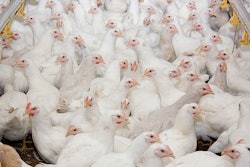On International Workers Day, United States Representatives Emanuel Cleaver, II (D-MO), Marcia Fudge (D-OH), and 46 Members of Congress called on the United States Department of Agriculture (USDA), Department of Labor (DOL) and the Department of Health and Human Services (HHS) to provide transparency and guidance to ensure workers are protected as they continue to operate in meat processing facilities. This effort comes after an Executive Order classifying these plants as critical infrastructure, forcing them to remain in operation.
In a letter to USDA Secretary Sonny Perdue, DOL Secretary Eugene Scalia, and HHS Secretary Alex Azar, Cleaver and Fudge wrote:
“Neither the Executive Order nor the subsequent press release issued by the Department of Agriculture (USDA) contain information about coordination between federal agencies to provide PPE or plans to increase coronavirus testing for plant employees and the surrounding communities. Over 6,500 employees at meat processing plants have either tested positive or gone into self-quarantine, and 20 workers have died since the start of the pandemic, according to the United Food and Commercial Workers Union.”
Recently, Saline County has seen a spike in COVID-19 cases, with many connected to outbreaks in meat processing plants. While Kansas City and St. Louis have seen the highest number of total cases, Saline County now holds the highest per capita rates in the state at 788 cases per 100,000 residents—more than seven times the rate of infection in Kansas City (108 per 100,000), according to the New York Times. In Saline, both Conagra and Cargill maintain meat processing plants in Marshall, Missouri. Conagra has confirmed at least 42 of their 700 employees have tested positive for COVID-19, and Cargill has confirmed cases, but declined to cite the total number.
“These processing plants are extraordinarily susceptible to outbreaks of COVID-19 due to the confined spaces in which workers perform their duties,” said Congressman Cleaver. “An outbreak in one of these plants can lead to spike in cases in our rural communities at-large, where populations tend to lean disproportionately toward individuals most vulnerable to complications from coronavirus.”
“I understand these facilities are critical to the food supply chain, but the safety of workers must always come first. Forcing these facilities to remain open without sufficient personal protective equipment (PPE) or protocols to ensure workers can maintain proper social distancing will put workers’ lives and rural communities at risk, not to mention the very real possibility that the plants will be unable to function efficiently without healthy workers.”
“The meat packing industry has been devastated by COVID-19, with infection hotspots appearing in processing plants across the country,” said Rep. Fudge. “While the security of our food supply is critical to keeping Americans fed during this crisis, forcing workers to choose between their jobs and their safety is reckless and irresponsible. If frontline food workers are to remain on the job, the Administration needs to put forward a clear plan for how it plans to protect and adequately compensate these workers.”
Cleaver and Fudge are asking the Secretaries to provide transparency to Congress and the public on the following:
- What guidance has been shared with meat processing plants regarding the steps they need to undertake to ensure worker health and safety before reopening or the steps they must undertake immediately to ensure worker health and safety if they are currently operating?
- How is the federal government coordinating with meat companies, employees, state and local health departments, and local communities?
- What is the plan and timeline for distribution of PPE for all plant employees and will these supplies be sourced from the states’ supply or the federal stockpile? Will there be continued deliveries of PPE while the DPA is invoked for these processing plants to ensure all employees are adequately protected?
- As part of the DPA and any forthcoming guidance, will companies be required to retrofit plants and/or modify shifts and other practices in order to ensure compliance with the Center for Disease Control (CDC) and Occupational Safety and Health Administration (OSHA) recommended social distancing?
- What enforcement mechanisms will be put in place to ensure OSHA and CDC guidance is adhered to at individual plants?
- Will there be a hotline or other mechanism for employees to report violations?
- Will increased testing be provided at these plants for symptomatic and asymptomatic employees, including contact tracing? Is there sufficient testing capacity to regularly test all employees, whether or not they are symptomatic?
You can find the official letter with a list of co-signers here.
Emanuel Cleaver, II is the U.S. Representative for Missouri's Fifth Congressional District, which includes Kansas City, Independence, Lee's Summit, Raytown, Grandview, Sugar Creek, Blue Springs, Grain Valley, Oak Grove, North Kansas City, Gladstone, Claycomo, and all of Ray, Lafayette, and Saline Counties. He is a member of the exclusive House Financial Services Committee; Chairman of the House Subcommittee on National Security, International Development, and Monetary Policy; member of the Select Committee on the Modernization of Congress; member of the Committee on Homeland Security; and a Senior Whip of the Democratic Caucus. For more information, please contact Matt Helfant at 202-590-0175 or [email protected] A high-resolution photo of Congressman Cleaver is available here.


















